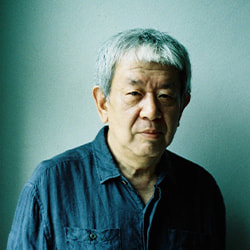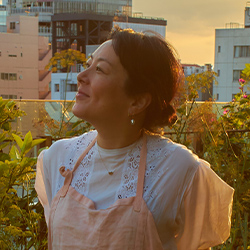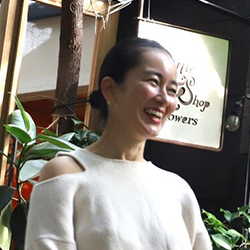Life is Beautiful: Clothing, Food & Plants, Housing “Plants serve as clothing that protects life, and food that sustains it”
Life is Beautiful: Clothing, Food & Plants, Housing “Plants serve as clothing that protects life, and food that sustains it”
Clothing, Food & Plants, Housing
“Plants serve as clothing
that protects life,
and food that sustains it”
There was a time when the usefulness of food and plants nurtured by the soil was central to people’s lives. People had discovered that they could sustain their lives by using plants as food, protect their bodies by making plants into clothing, and build homes from plants to housing them from inclement weather. The various techniques for living based on clothing, food, and housing represent the collected wisdom of people who sharpened their senses and exercised their ingenuity to take full advantage of what gifts nature provided. This wisdom was passed down as an additional gift to children and later generations, who went on to further develop these techniques.
Yuri Nomura and Yukari Iki have worked side by side for the 20 years that have passed since they set up adjoining businesses—restaurant eatrip and the little shop of flowers—on a parcel of land in Tokyo’s Harajuku district. Considering the essence of food and flowers reveals that a shared dependence on soil connects them at a deep level. That relationship has been affirmed by both of these two women on their journeys to explore what is most important in their respective vocations. Handling life, in the form of food or plants, on a daily basis creates feelings that are impossible to verbalize, but three years ago, Nomura and Iki co-authored Tasty of Life (published by Seigensha in May 2019), a book which is a collection of a series of these moments. Their quest is to look to the soil that cycles all living things, bring in techniques that can be part of that cycle, and weave them together in a modern way. This is reflected in the title of the exhibition, “Life is beautiful.” The question is what we can learn from clothing, food, and housing of earlier times when life was lived in close connection to the cycle of the soil, how should we make use of it, and how do we connect it to what comes next? This exhibition provides a place for people to free their imaginations and deepen their understanding in the company of those who have served as wayfinders in this search.
This exhibition presents “clothing, food & plants” focusing on majotae, a fabric newly recreated by artist Shinichiro Yoshida, director of the Asafu Institute, using modern spinning and weaving techniques in order to bring back hemp cloth, which had been considered a special fabric in ancient Japan. In the Edo period, when Japan was a sustainable society, hemp (taima) and ramie (choma) were considered beneficial plants that played a central part in people's lives and were indispensable as sacred plants for Shinto rituals. Referencing a collection of ancient hemp cloth, which crystallizes the wisdom of harvesting, fiber extraction, processing, spinning, and weaving the fibers of hemp plants grown in the soil, the exhibition unravels the possibilities of the modern hemp cloth majotae, which will surely regain a significant role in our future lives. Through the cycle of seeds falling into the soil and sprouting, plants have played a key role in sustaining human life, sometimes serving as clothing and sometimes as food. As we experience once more practices employed since ancient times, we hope to be able to discover new types of clothing, food, and housing that should be made a part of our future.
Zone 1
「INTRO」
Zone 2
「PAST」
Zone 3
「PRESENT」
Zone 4
「FUTURE」
- Shinichiro Yoshida
Director of the Asafu Institute -
 Yoshida has a long record of studying ancient textiles. He is currently researching natural textiles of Japan, especially the fibers and yarns of the hemp and ramie cloth of the Edo period. He has curated exhibitions and made presentations at many venues, including the Nara Prefectural Museum of Folklore, San Francisco Craft and Folk Art Museum, National Museum Of Japanese History, Tokamachi City Museum, Notogawa Museum, Aisho Town Museum of History and Culture, YCAM, and Karamushi Traditional Craft Museum.
Yoshida has a long record of studying ancient textiles. He is currently researching natural textiles of Japan, especially the fibers and yarns of the hemp and ramie cloth of the Edo period. He has curated exhibitions and made presentations at many venues, including the Nara Prefectural Museum of Folklore, San Francisco Craft and Folk Art Museum, National Museum Of Japanese History, Tokamachi City Museum, Notogawa Museum, Aisho Town Museum of History and Culture, YCAM, and Karamushi Traditional Craft Museum. - Yuri Nomura
eatrip Director/Chef -
 Nomura embarked on a culinary path thanks to the influence of her mother, who taught hospitality classes for many years. Expressing the possibilities of food in many ways, she directs catering events, gives cooking classes, writes magazine columns, and hosts radio programs. Beyond that, she develops recipes, plans events, and provides cooking supervision for movies and television. Nomura opened restaurant eatrip in Harajuku in 2012 and eatrip soil on Omotesando in November 2019. Through cooking, she pursues activities that convey the power, bounty, and deliciousness of food, with respect for the producers, the wild, and the seasons. Her books include Tasty of Life (published by Seigensha), written with Yukari Iki.
Nomura embarked on a culinary path thanks to the influence of her mother, who taught hospitality classes for many years. Expressing the possibilities of food in many ways, she directs catering events, gives cooking classes, writes magazine columns, and hosts radio programs. Beyond that, she develops recipes, plans events, and provides cooking supervision for movies and television. Nomura opened restaurant eatrip in Harajuku in 2012 and eatrip soil on Omotesando in November 2019. Through cooking, she pursues activities that convey the power, bounty, and deliciousness of food, with respect for the producers, the wild, and the seasons. Her books include Tasty of Life (published by Seigensha), written with Yukari Iki. - Yukari Iki
The Little Shop of Flowers Proprietor -
 Iki has a background in interior design and corporate communications. Inspired by the rich color of flowers, she established The Little Shop of Flowers/Little in 2010. The shop is now located in Harajuku. She also opened The Little Bar of Flowers in Shibuya in 2019. While running her flower shop as a service that expresses people’s feelings through flowers, handling flower decorations for weddings, parties, and other events, organizing workshops, and styling flowers together with small items, she began creating dyes from discarded flowers and turning the colors and other benefits of flowers into gifts that can become a part of our lives. A firm believer in the power of plants and flowers, Iki is constantly seeking new situations in which she can unobtrusively make them a comforting, familiar part of people’s lives.
Iki has a background in interior design and corporate communications. Inspired by the rich color of flowers, she established The Little Shop of Flowers/Little in 2010. The shop is now located in Harajuku. She also opened The Little Bar of Flowers in Shibuya in 2019. While running her flower shop as a service that expresses people’s feelings through flowers, handling flower decorations for weddings, parties, and other events, organizing workshops, and styling flowers together with small items, she began creating dyes from discarded flowers and turning the colors and other benefits of flowers into gifts that can become a part of our lives. A firm believer in the power of plants and flowers, Iki is constantly seeking new situations in which she can unobtrusively make them a comforting, familiar part of people’s lives.
Life is Beautiful :
Clothing, Food & Plants, Housing
“Plants serve as clothing that protects life,
and food that sustains it”
- Period
- November 3 – Novemer 30, 2021
11:00 – 20:00 / Open daily
- Venue
-
GYRE GALLERY / GYRE 3F
5-10–1 Jingumae, Shibuya-ku, Tokyo.
Tel. 03-3498-6990
- Organizer
- GYRE
- Exhibition design
- eatrip & the little shop of flowers
- Curators
- Yuri Nomura, Yukari Iki
- Textile exhibit direction
- Shinichiro Yoshida, Hirokazu Watanabe (the majotae team)
- Venue design
- Takashi Nakahara
- Text & Editing
- Eri Ishida
- Graphic Art
- Yuma Higuchi
- Signage Design
- Jun Tsunoda
- With cooperation from
- Taro Mizutani, Cosmic Compost, WONDER FULL LIFE, HiRAO INC and PARK./SUTHERLAND